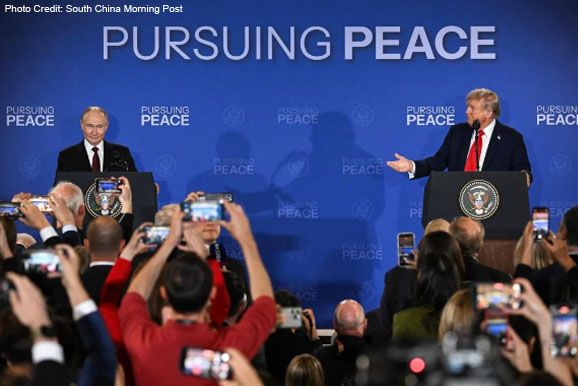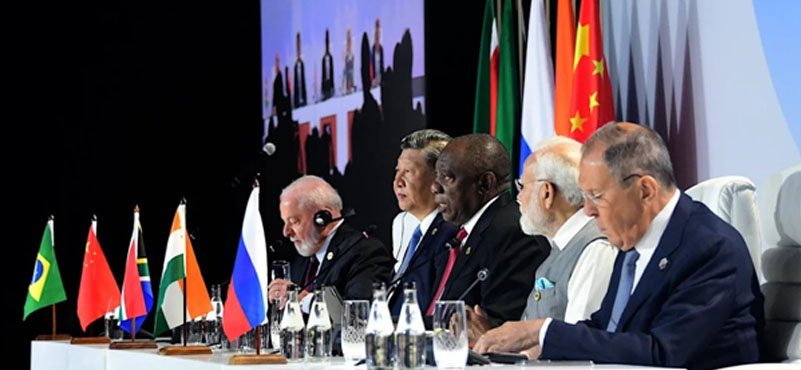The tarmac at Elmendorf Air Force Base in Anchorage, Alaska, carried more than the weight of two motorcades and their entourages. It carried the expectations of a world anxious for an end to the war in Ukraine. On one side stood President Donald Trump, returning once more to the role of solo negotiator. On the other side, President Vladimir Putin, colder yet commanding, relished his long-coveted return to American soil. For three hours behind closed doors, these two leaders tested each other’s resolve, poker-faced across the table in what many had hoped would be a turning point. The verdict is now clear – Advantage Putin. As the summit drew to a close after hours of tense discussion, the answers were sobering. There was calm rhetoric, handshakes, and ceremony. Yet there was no ceasefire, no written compromise, no real shift in positions. Putin left with a symbolic win. Trump left with vague words about “progress.” Ukraine, the nation at the heart of the war, was not even at the table.
A Showcase of Symbolism
Why Alaska? Both sides stressed practicality: halfway between Moscow and Washington, close but neutral, a piece of American territory that once belonged to Russia. But the symbolism ran deeper. Trump projected an image of both openness and American assertion. By accepting, Putin cleverly wrapped himself in the optics of parity, presenting Russia as an equal power arrayed against the United States. That symbolism cannot be overstated. It was the Kremlin chief’s first visit to American ground in a decade, and merely standing beside Trump, in front of flags and honour guards, reaffirmed Russia’s centrality to global affairs. For Trump, the gamble was to project statesmanship, the art of the grand bargain. Yet the expectations were high and odds with the reality of the mistrust, sanctions and bloodshed.

The Hollow Core of the Talks
Behind the red carpet and crisp salutes, the discussion itself produced little substance. Trump leaned on his characteristic phrasing of “headway” and “advancements,” but those words rang hollow when placed against the facts. No roadmap for a ceasefire. No common statement on de-escalation. Not even a symbolic humanitarian gesture. Putin’s language was the mirror opposite: calm, unyielding, and repetitive. He returned once again to his mantra that Russia’s “security concerns” had to be addressed. For him, any Ukrainian integration with NATO or the EU crossed an existential line. He was not prepared to compromise that core position. The reality was no ceasefire, no framework for negotiations, not even symbolic gestures toward de-escalation. This chilling simultaneity reminded everyone watching that the war is ongoing, relentless, and impervious to ceremony.
The Missing Seat at the Table
The absence of Ukraine itself underscored the flaw in the design. Leaders spoke about Ukraine; they did not speak with Ukraine. History is full of examples where great powers negotiated over smaller nations’ futures without letting them into the room. For Ukrainians, Alaska looked far too much like one of those moments.
The omission was reinforced by Trump’s remarks afterwards: he repeated that “Zelensky has to make a deal.” On the surface, it seemed that practical negotiations could not occur without Ukraine’s consent. But in context, it felt like an abdication. It placed the burden squarely on Kyiv while projecting Washington as merely a facilitator. That framing worked tactically for Trump, since it insulated him from immediate blame, but strategically it left Ukraine exposed.

Putin’s Wins Without Concessions
Putin walked away without altering his war policy. He gave up nothing. He softened nothing. Yet he reaped several advantages.
Legitimacy restored: appearing side by side with Trump in Alaska repositioned him as an indispensable world leader, not an international pariah. Images matter. Russian state television will play those images endlessly, reinforcing the narrative that Russia cannot be sidelined.
Diplomatic recognition with no price: Putin sat on U.S. soil, under American protection, while offering zero concessions on Ukraine. In diplomacy, merely holding one’s ground can amount to a win.
Shaping the arena: he pressed for sanctions relief once more, and while there was no agreement, the fact that sanctions were openly discussed showed his persistence in opening cracks in the West’s consensus.
Historic framing: Putin invoked Russian history, cultural ties, and the necessity of “healthy U.S.-Russia relations.” Whether the narrative convinces Western leaders is secondary; the goal was to remind the Russian domestic audience that their leader speaks as an equal to Washington.
Meanwhile, Trump gave him the optics. Trump himself won plaudits for hosting, but in substance, even sympathetic security experts admit that the Russian president walked away the bigger winner. Advantage Putin.
What Options Remain?
The outcome does not mean diplomacy is futile. On the contrary, it revealed the parameters of what lies ahead.
Incremental diplomacy may now take over, where lower-level envoys shuttle between capitals in search of piecemeal trust-building. These steps will be slow and fragile, yet historically, even the Cold War produced arms control treaties after a long series of small exchanges.
Inclusion of Ukraine will be essential in future rounds if talks are to have legitimacy. European mediators, perhaps Germany, France, or Turkey, could be brought in to broaden the process. Allowing Putin and Trump alone to script the stage risks sidelining the very nation in peril.
Sanctions pressure remains Washington’s clearest coercive tool. Russia’s economy is battered, yet Putin has proven resilient under pressure. The West must be creative in tightening measures when escalation continues, but leaving open the possibility of easing targeted sanctions if verifiable steps toward peace occur. Putin bought time.
Domestic constraints may surprise. Trump faces a sceptical Congress and an electorate wary of making concessions to Moscow. Putin faces an economy shrunk by war and a population increasingly fatigued. Either leader could be forced into tactical recalibration by pressures at home.
The danger of escalation shadows everything. Failure at the diplomatic table could mean expansion of conflict in Europe or miscalculation between NATO and Russia. The stakes remain extraordinary, which is why even talks that seem empty still serve a purpose: they prevent silence, and silence is more dangerous than dialogue.
And finally, humanitarian action must not wait. Aid for refugees, reconstruction of Ukrainian cities, support for displaced families — these are the urgent steps Western institutions and global agencies can push forward while leaders continue to wrangle over the larger questions of sovereignty and security.
A Summit Without Settlement
The Alaska summit demonstrated both the necessity and the limits of presidential diplomacy. It conveyed that peace cannot be willed into existence by optics or ceremony. Trump proved willing to meet. Putin proved unwilling to budge. The war continues unabated. Ukraine remains the central victim. And the world understands again that symbolic gestures, however grand, cannot substitute for actual agreements.
Yet even in failure, summits matter. They clarify positions. They signal intentions. They force both sides to reveal, however subtly, what they value most. For Trump, it was the appearance of progress. For Putin, it was recognition as one among the equals and power without concessions. For Ukraine, it remained that it was a pawn in the Western global play.
Alaska may go down as nothing more than a stage on which Putin tightened his grip on global optics while the suffering in Ukraine went on undeterred, and the US with a photo-op that left war untouched.
ABOUT THE AUTHOR
 Lieutenant General A B Shivane, is the former Strike Corps Commander and Director General of Mechanised Forces. As a scholar warrior, he has authored over 200 publications on national security and matters defence, besides four books and is an internationally renowned keynote speaker. The General was a Consultant to the Ministry of Defence (Ordnance Factory Board) post-superannuation. He was the Distinguished Fellow and held COAS Chair of Excellence at the Centre for Land Warfare Studies 2021 2022. He is also the Senior Advisor Board Member to several organisations and Think Tanks.
Lieutenant General A B Shivane, is the former Strike Corps Commander and Director General of Mechanised Forces. As a scholar warrior, he has authored over 200 publications on national security and matters defence, besides four books and is an internationally renowned keynote speaker. The General was a Consultant to the Ministry of Defence (Ordnance Factory Board) post-superannuation. He was the Distinguished Fellow and held COAS Chair of Excellence at the Centre for Land Warfare Studies 2021 2022. He is also the Senior Advisor Board Member to several organisations and Think Tanks.








